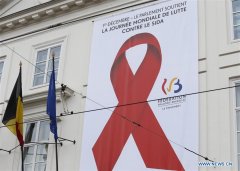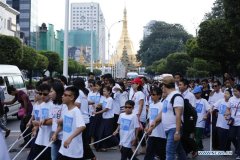Feature: Afghan physician eyes Chinese partnership to legalize traditional medicine
by Farid Behbud
KABUL, Sept. 11 (Xinhua) -- Fed up with low-quality medication in their country, a rough number of Afghan people are still staying close enough to always use traditional medication, wherever available at the center and provinces.
The initiative to legalize an effective traditional medicine, if practiced, would promote a formal, legal and scientific traditional medication within the country's health sector to cure hundreds of people suffering physical and mental ailment, or diseases which are too hard to be healed by modern medicines.
During one of his few days stay in China, an Afghan head of Mora Hospital, Dr. Azizullah Amir, was inspired by a real physical therapy of some special Chinese traditional medicines as suggested by many of his visited museums and drug-stores prescribing legal, official and scientific medicines produced from various types of herbs and plants.
"We want to do something new, especially in Afghanistan, in partnership with the Chinese traditional medicine practitioners to promote Chinese Traditional Medicine (CTM) in Afghanistan," Amir, founder and chief of Mora Hospital, told Xinhua in an interview, adding that he was fully determined to do that.
Though it is still a theory, Amir was confident that he could put it into practice in his country, rich with medicinal herbs, in a partnership with Chinese experts interested in investment to development the folk remedy.
It is possible to reach the goal, as people have once been familiar with such a remedy, in the course of history, when there were no modern hospitals or the current up-to-date medicines, but how could soon develop and replace it with the once badly and illegally used such method in the name of Tababat-e-Unani or Greek Medication, in a country, with people of lower information about which one could alleviate their pains.
"It is very easy, we want to invest in this field in cooperation with Chinese specialists, work in cooperation with the Ministry of Public Health, import the needed laboratories from China first, and then launch awareness programs among the people to refrain from using poor so-called herbal medicines, illegally sold along the streets and some other stores," said Amir who hoped he would reach the target.
While visiting China, the Afghan physician said he had also heard from the Chinese people about how pharmacies in their country produced high-quality medicinal herbs, how the traditional remedy could prove with higher effective and lower side-effects and how traditional practitioners could cure people with physical and mental conditions through acupuncture and physiotherapy systems.
Amir has found that Chinese people have their own initiated medicinal technique, so he wanted to establish the traditional healing (Chinese Traditional Medicine) as a new health department of his hospital.
"I decided to have the initiation in my own country to help my compatriots with economic problem access the low-priced therapy, through herbal," Amir said, adding that his hospital was a scientific and educational entity planned to offer better and quality services for the people.
As in Afghanistan, most patients complain about some harmful side-effects which the modern medication may cause after and during treatment, the traditional medicines are likely to have the lowermost side-effects.
"There was a big different between the two curing methods; Chinese Traditional Medication can produce medicines and pills from certain herbs and plants, with lowest side-effects, while the modern therapy is not empty of higher side-effects," said Amir.
Considering the date-expired medicines being vended everywhere in the capital and some Afghan big cities, and lack of the people awareness about the harms, there was a need to take enough time to divert attention of the people from out-of-date medicines and help them get full familiarity with a real, scientific and legal healing system; either traditional or modern methods.
The mountainous Afghanistan is rich with medicinal herbs as excluding the illicit export trade of opium, principal legal exports from the Afghanistan were carpets and rugs, dried fruits, precious stones as well as medicinal plants.
Traditional medicine or indigenous medicine comprises medical aspects of traditional knowledge that developed over generations within various societies before the era of modern medicine, with the Mora Hospital chief saying it could easily be possible through physiotherapy and acupuncture system.
Acupuncture is a method of complementary medicine involving pricking of the skin or tissues with needles.
Some 9 percent of Afghans had access to health care during the Taliban regime, which was ousted in late 2001, but the number increased to 67 percent in 2016.
Established in 2016, Mora Hospital is the first-ever health, scientific and educational center, dedicated for women, comprising various sections, including general medical, pharmacy, nursing, laboratory, mental health and dental and physiotherapy services. It also includes nursery, high school and university equipped with dormitory.
The center, which is located in Afshar, western part of Kabul, has over 1,000 students.















